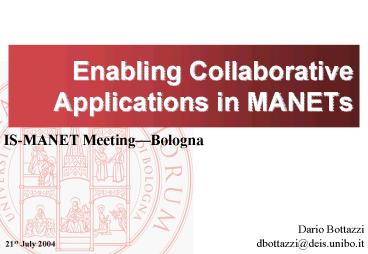Enabling Collaborative Applications in MANETs - PowerPoint PPT Presentation
1 / 25
Title:
Enabling Collaborative Applications in MANETs
Description:
The AGAPE Framework. ALLOCATION AND GROUP-AWARE PERVASIVE ENVIRONMENTS ... AGAPE Groups ... AGAPE Communication ... – PowerPoint PPT presentation
Number of Views:71
Avg rating:3.0/5.0
Title: Enabling Collaborative Applications in MANETs
1
Enabling Collaborative Applications in MANETs
IS-MANET MeetingBologna
Dario Bottazzi
dbottazzi_at_deis.unibo.it
21st July 2004
2
Outline
- Group Membership and Group Communication
Requirements and Solutions in MANETs - The AGAPE Framework
- Group Membership
- Group Communication
- Case Study and Results Evaluation
- Conclusions Future Work
3
New Opportunities for Impromptu Collaboration in
MANETs
- New MANET scenario
- proliferation wireless-enabled portable devices
- recent advances in MANET technology
- User requirement
- Traditional services (www, e-mail,)
- Innovative Collaborative Applications
- Emergency Response
- Automotive
- Games
4
Impromptu Collaboration
- A Group is a set of co-located autonomous
entities that can communicate, collaborate with
each other. All members agree on group
activities, tasks and goals. - Group Collaboration is
- Proximity-Based co-located group members are
likely to operate more often than with the
others. - Location-based the members of the group access
available services and resources. - Impromptu collaboration require no prior
planning - Transient interactions are short-lived
5
New Challenges in Collaborative Applications
- Highly dynamic Nature of Ad-Hoc Groups
- Device Mobility, Run-Time Join-Leave
- Impromptu Nature of Collaboration Activities
- Collaboration Between Previously Unknown
Partners - Highly Dynamic Nature of MANETs
- Frequent Host Connections and Disconnections
- Frequent Network Partitions
- Heterogeneous Characteristics of Group Members
- Resource scarcity
6
Group Membership Communication
- Traditional Group Membership and Communication
Solutions - ISIS, Horus, Transis, JGroup,
- View-oriented
- Aim to provide members a commonly agreed
perception of the composition of the group. - Relevant computational resources
- Suppose the availability of high bandwidth
reliable multicast and total ordered
communication channels
7
Recent Research Efforts
- Global Virtual Data Space-Based Systems (GVDS)
- LIME, PeerWare, Xmiddle, TOTA
- GVDS aim to coordinating
- Transiently shared data space that is partitioned
between collaborating entities - Group membership and communication coupled to
the data space - Profile-Based Collaboration Systems
- Proem
- At regular times each entity broadcasts its
profile - Application provided with the visibility of
neighbors profiles - Group membership relies on the implementation of
the same application-level protocols
8
The AGAPE Framework
ALLOCATION AND GROUP-AWARE PERVASIVE ENVIRONMENTS
- Context-Aware Group Membership and Communication
Middleware - Users have direct visibility of only locally
available set of group members and
characteristics (Context-dependent View) - AGAPE Groups
- Each group is characterized by a group unique
identifier and by a group profile (commonly
agreed interests, preferences, activities and
goals) - The set of members that compose a group is not
a-priori determined, but can dynamically change - Two entity roles the Managed Entity (ME) and
the Locality Manager Entity (LME)
9
AGAPE Locality
10
Communication Model
- Communication Pattern
- Context-Based Any-Cast/Multi-Cast
- Profile
- Binding Strategy (Early/Late Binding Strategy)
- Designation Criteria (only for Context-Based
Any-cast) - Message Scheduling
- Message Presentation
11
Context-Based Any-Cast
ME 7
ME 2
ME 4
LME 1
ME 6
ME 8
ME 1
ME 5
Locality1
ME 3
ME 9
12
Architecture
13
Case StudyEmergency Response
- The application aggregates together firemen
working within the same area, - provides firemen with the visibility of the
colleagues - allows firemen to communicate instructions or
images via messages exchanges. - Firemen interoperate via a IEEE 802.11b-based
MANET with AODV routing protocol and statically
configured IP addresses.
14
Case StudyEmergency Response
- Devices
- Firemen of high rank lap-tops, Fedora Linux,
J2SE 1.4 and the AGAPE release for resource rich
devices. - Firemen of low rank iPAQ PDAs, Linux Familiar,
Personal Java and the AGAPE release for resource
constrained devices. - CC/PP-compliant profiles
- Firemen profiles firemens name and rank.
- Device profiles
- Group profiles identify the goals of the fire
brigade community.
15
Case Study
16
Case Study
17
Preliminary Results
Nme PDAs
Nme 1..19 PDAs Tb 5, 10, 15, 20, 25 sec Tv
20, 40, 60, 80, 100 sec
ME1
MEn
ME1
LME1
ME1
1 hop
ME1
Tv20
Tv40
bps
Tv60
Tv80
Tv100
Nme
B
beacon dissemination
18
Ordinary Operating Conditions
5 PDAs
N2hops 1..14 Tb 5, 10, 15, 20, 25 sec Tv 20,
40, 60, 80, 100 sec
ME10
ME9
ME3
ME4
ME5
ME8
ME6
ME2
LME1
1 hop
ME1
ME7
2 hop
N2hops PDAs
Tb5
Tv20
bps
bps
Tb10
Tv40
Tb15
Tv60
Tb20
Tv80
Tb25
Tv100
N2hops
N2hops
C
D
beacon dissemination
View dissemination
19
Conclusions
- The MANET scenario calls for re-thinking group
membership and group communication solutions - AGAPE Group Management
- Context-aware group membership management
solution suitable for MANETs. - AGAPE Communication
- Context-aware group communication solution that
permits to deliver messages, to tailor their
format and to schedule their presentation order
on the basis of context information.
20
Thanks
Questions?
21
Group Promotion
22
View Dissemination
23
Joining
24
Any-Cast Communication
25
Receive Message
MSS
MPMS
CS
Application
VMS
Incoming Message
Possibly Message Delay
User/Device Profile Request
Message Transcoding Request
User/Device Profile Return
Possibly Message Transcoding
Message Delivery
Message Request
Message Return































